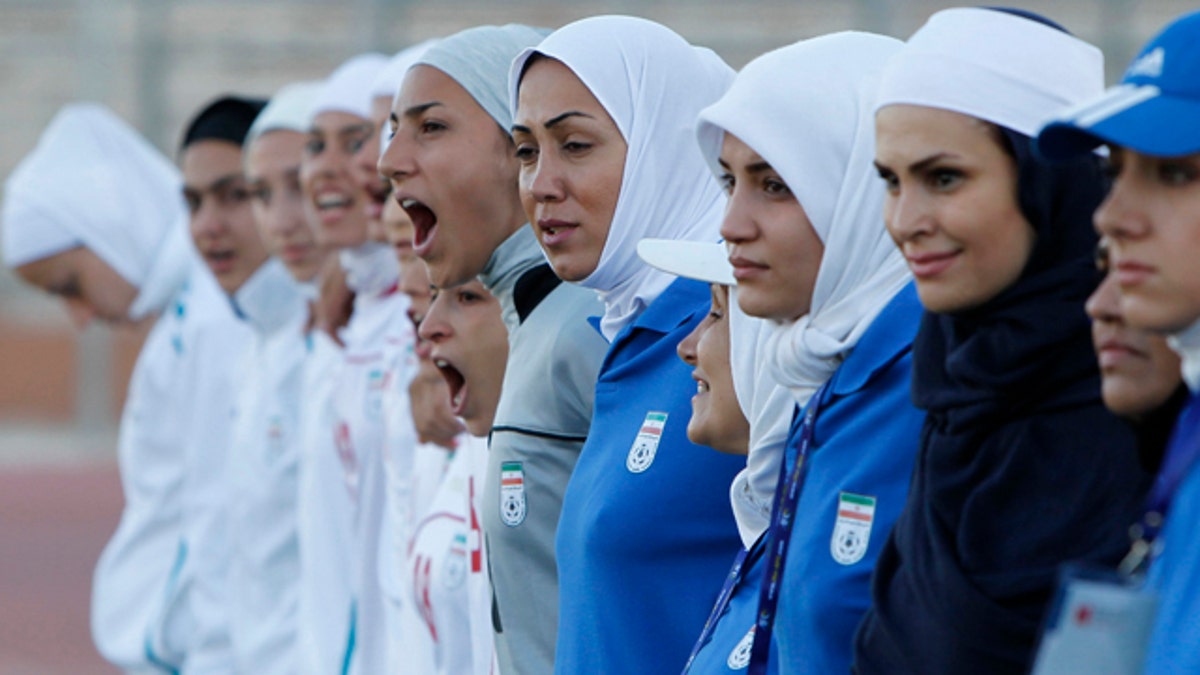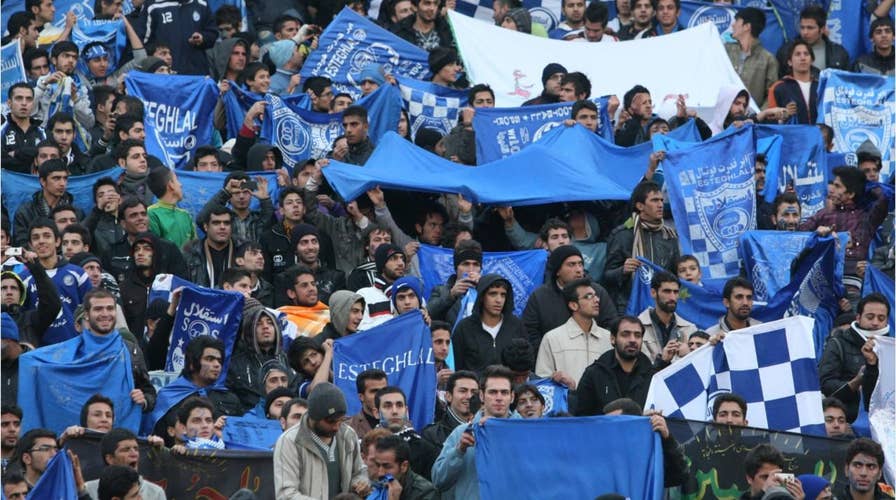Iranian female soccer fan 'blue girl' dies after setting herself on fire
Iranian female soccer fan 'blue girl' dies after setting herself on fire. She was being charged with being dressed as a man to watch a soccer game. Women are not allowed to enter the soccer stadium in Iran.
FIFA is feeling the heat.
Back in March, Sahar Khodayari, a lifelong soccer fan, desperately wanted to see her favorite team, Esteghlal, take on the United Arab Emirates. But as a woman in Iran she could neither buy tickets or enter the stadium. So Khodayari dressed as a man and snuck her way into Tehran’s main sporting venue, Azadi Stadium.
She didn't succeed. She was quickly apprehended by authorities and disappeared behind bars. More than six months after her alleged crime, the 29-year-old faced trial last week and responded to charges of “open committing a sinful act by appearing in public without a hijab.” But the idea of spending more months or years in jail was apparently too much for the passionate sports devotee and, in an act of sheer anguish and protest, she set herself on fire outside the courthouse.
With more than 90 percent of her body ravished by third-degree burns, Khodayari succumbed to her injuries and died on Monday. She has since been designated “Blue Girl” on social media in homage to the palette of her favorite team. But even in death the Blue Girl is making a mark.
JAILED IRANIAN MUSICIAN REBUFFS REGIME'S BAN BY RELEASING ALBUM ABOUT WAR AND OPPRESSION
The incident has ignited global outrage, not only toward Tehran for its draconian prohibition, but also toward FIFA, the international governing body for soccer, for failing to discipline Iran for its decades-long gender bias.
“It’s currently unclear to me why FIFA has not been able to put this issue in bright lights earlier. Iranians of all stripes, from filmmakers to sports fans to human rights activists have all grappled with this issue before,” Behnam Ben Taleblu, senior fellow at the Foundation for Defense of Democracies (FDD) told Fox News. “The ban on women in stadiums in Iran for soccer matches is just one vector of insight into how the regime in Iran treats those whom it fears. For as long as there has been an Islamic Republic, there have been constraints in women in public life.”
Outraged individuals from all walks of life – professional soccer players to politicians to human rights advocates – again united in a growing social media chorus this week to demand FIFA to come down hard on Tehran’s policy.
Maryam Shojaei, the sister of Iran’s national football team captain Masoud Shojaei, is leading the charge as a member of the advocacy group Open Stadiums.
“If humiliation, detention, and prison weren’t enough for #FIFA to take action now one (has) burnt herself to show Iranian women want to watch football too,” she wrote on Twitter.
On Wednesday, Esteghlal held a minute of silence ahead of their training session in memory of their late fan. They also published a statement of grief.
“The tragic death of our beloved child, Ms. Sahar Khodayari, has caused much sadness and regret for Esteghlal FC,” the club stated. “We offer condolences to you and your relatives.”
According to Taleblu, there are concrete steps that can be taken.
“Sanctions should most certainly, though not exclusively, be one way the international community can put pressure on Iran and shine a spotlight on the regime’s discriminatory practices at home. In this regard, international and multilateral sanctions should play a greater role,” he said. “These international sanctions can be anything from human rights penalties to economic pressure from sports companies to political pressure from FIFA officials. Ultimately, FIFA may not have the best record to stand-on. But it does carry and convey authority. FIFA should stand firm and not back down.”
National Iranian American Council Research Fellow, Assal Rad, concurred that FIFA can sanction Iran and impact its participation in tournaments, which would likely lead to a considerable response internally.
"Iranians are not only huge sports fans, but they also take great pride in their national teams, especially soccer. Scenes of Iranians celebrating in the streets after national team victories are commonplace," she said. "At the same time, Iranians have shown their discontent with the government's discriminatory policies, especially against women. The combined force of these issues could provoke demonstrations if Iran does not comply with FIFA's standards."
Moreover, Philippe Nassif, advocacy director for the Middle East and North Africa at Amnesty International USA told Fox News: “FIFA and all companies, when faced with a human rights issue such as this, can always take a stand and ask for a change in policy from the government in question.”
“They can also make a decision as to whether they want to be associated with a government’s policies by not participating or making a statement that a change is needed,” he continued. “Iran has marginalized women along with political, environmental and civil society activists for decades, and this behavior is only the latest in a long pattern of human rights abuses the Iranian government has engaged in."
FIFA did not immediately respond to a request for further comment on the matter, but in statements issued earlier this week it boldly refuted any suggestions that it has “been inactive in the fight for these women’s rights in Iran.”

The Iranian women's national soccer team lines up before its qualifying match against Jordan for the 2012 London Olympic Games in Amman, June 3, 2011. The Iranian team was banned from the match on Friday in the second round of qualifiers in protest against guidelines on its headscarves. (Reuters)
The international soccer body has said it is “working with” the Iranian Football Association in the hopes to make sure that females can enter the stadium when the World Cup qualifiers start in October. Iran is set to square off against Cambodia on Oct. 10.
Soon after news of Khodayari’s death became public, FIFA released a statement of “deep regret” of the “tragedy.”
“FIFA conveys our condolences to the family and friends of Sahar and reiterate our calls on the Iranian authorities to ensure the freedom and safety of any women engaged in this legitimate fight to end the stadium ban for women in Iran,” the statement said.
FIFA officials are expected to visit Iran within the next two weeks to check on preparations for the October games, according to Reuters, but it is not clear to what degree the issue surrounding female access to tickets and stadiums will be addressed.
FIFA statutes mandate that gender discrimination is punishable by suspension or expulsion. But the ban against women is hardly new in the Islamic republic, and has gone on unabated for 30 years.
The prohibition against women watching soccer is not ingrained in Iran's law but was introduced soon after the 1979 Islamic Revolution, which ushered in an authoritarian religious rule. The reigning Ayatollah Khamenei and Iranian fundamentalists consider women in the public stadiums as contrary to the principles of the Islamic revolution.
THE MASTER BEHIND THE MASK: WHO IS IRAN’S MOST FEARED AND POWERFUL MILITARY COMMANDER?
However, Iranian President Hassan Rouhani’s chief of staff, Mahmoud Vaezi, told state television on Wednesday that they “don’t have a problem with women attending if the atmosphere in stadiums is convenient.”
“But with so much foul language among fans and violence, this is not advisable,” he continued.
A few times in the recent past, Tehran has allowed women – generally players’ relatives or government officials – to watch games, mostly to alleviate pressure from FIFA. But some human rights’ bodies view this as a Tehran ploy to manipulate the chief soccer federation with no intention of making meaningful changes.
As deeply-entrenched as soccer is in the social fabric of the country, many are willing to forgo it in the quest for the regulation against women to be scrapped.
“The news has made a lot of news in Iran. The football players and the artists have made a big point about it. Famous Iranian football players are urging people not to go to the stadium anymore until women can freely enter,” added one prominent Iranian activist, Mehdi Rajabian, based in the province of Mazandaran. “Last night, many lit candles at the Blue Girl’s self-immolation site. Many don’t even want to follow the results of football, even on the television.”









































